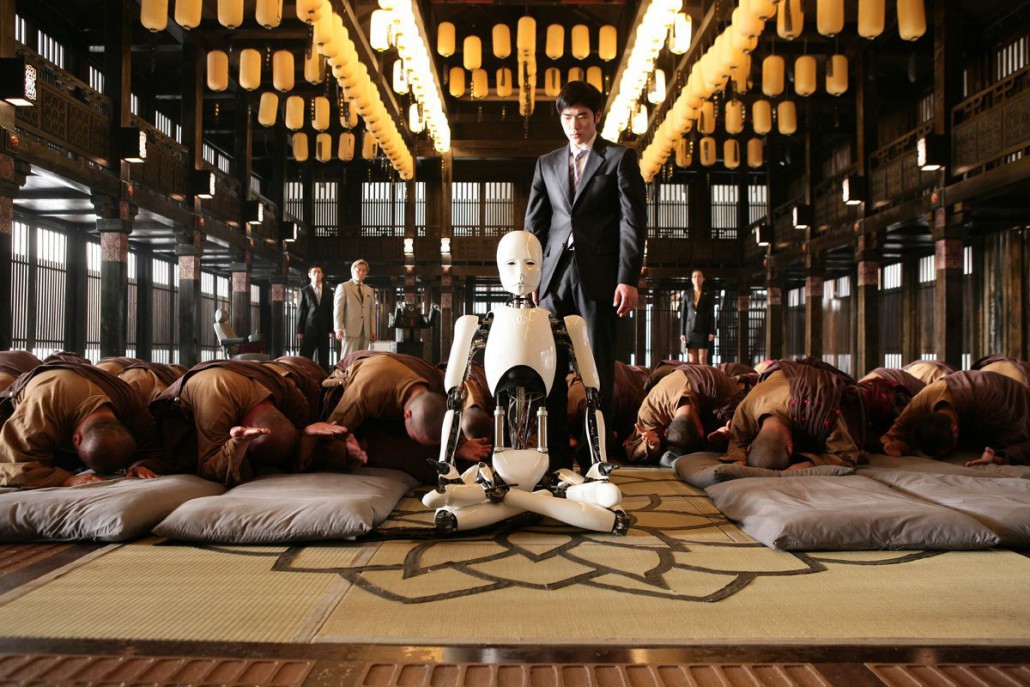
Unsurprisingly, the world ends in Doomsday Book. Not once, though, but three times. Directed by Kim Jee-woon (A Bittersweet Life) and Yim Pil-sung, this sci-fi anthology film tells a trio of Korean-flavored apocalyptic-ish stories. I say apocalyptic-ish, because Doomsday Book lies in a different category from 2012, World War Z, and other big budget, big explosion doomsday blockbusters. Admittedly, the film’s first and third segments have traditional world-ending narratives (zombie apocalypse, collision of celestial body into Earth). However, in the second nothing tangible gets destroyed, and all three segments emphasize philosophy and humanity as opposed to heroes rocketing away to nuke asteroids. It seems like Kim and Yim wanted to bring a more thoughtful, quirky flavor to the apocalypse; they proceed with an ambition to show that the end of the world can be artistic too. Desires and ambitions, however, don’t always translate well into art.
Doomsday Book‘s first segment is called “A Brave New World”, but it has nothing to do with hedonistic sex or drug consumption, as its namesake Aldous Huxley novel might lead us to believe. Instead, it’s the story of a Korean zombie apocalypse, one caused by tainted beef. The short centers around a nerdy research scientist named Yoo Seok-woo. Yoo goes on a date with a girl named Kim Yoo-min; they realize they really like each other, things get hot and heavy, and…Yoo starts exhibiting zombie symptoms. One thing leads to another, and soon all of Seoul gets turned into zombies, with the authorities powerless to help. While a Korean zombie apocalypse sounds awesome in concept (imagine a movie with zombified K-pop stars!), “A Brave New World” is simply too short to flesh (forgive me for the pun) out the concept in detail. Yoo and Kim remain one-dimensional throughout the whole segment, the plot hurried along with little suspense, and any musings on what it means to be human, if they existed, don’t come through to the audience. The only (slightly) redeeming factor of “A Brave New World” is its smattering of commentary on government incompetence — but that still pales in comparison to something like The Host (South Korea’s most famous/renowned monster movie).
“The Heavenly Creature” is the film’s second segment, and it’s better than “A Brave New World”. Set in a not-so-far-off future in which robots have become ubiquitous, it centers around a robot repairman who’s dispatched to a Buddhist monastery. On a philosophical level, its premise is quite fascinating–what if a robot could achieve enlightenment? When “the world ends” in this segment, it’s not a tangible end, it’s a spiritual end. If your world is constructed upon the belief that humans are the only beings capable of reaching nirvana, what happens when evidence arises to the contrary? That’s the question “The Heavenly Creature” broaches, and it does an OK, but not fantastic, job at it. Cinematography and suspense are a notch up in this segment compared with “A Brave New World”, but that’s not saying too much. Our repairman protagonist himself seems like a robot who’s been pre-programmed to say certain things or change certain mindsets to advance the short’s plot. Maybe that’s intentional — but too many robots in this segment can slightly spoil the broth.
While “A Brave New World” smelled of a horror movie and “The Heavenly Creature” took a philosophical route, Doomsday Book‘s last segment, “Happy Birthday”, styles itself a comedy. A girl named Park Min-seo damages her father’s prized 8-ball and tries to cover up her misdeed by ordering a replacement from a strange website. She throws the original 8-ball out the window and life goes on…until two years later, when an asteroid that looks exactly like a giant 8-ball comes hurtling towards Earth. While her family prepares an underground shelter, Park grapples with the possibility that she may have inadvertently triggered the oncoming apocalypse. Quirkiness pervades this segment, and is its saving grace. Out of all three segments, “Happy Birthday” was the most directly entertaining, inspiring sprinkles of dark-humored laughs (especially with its satirical depiction of newscasters broadcasting live about the incoming asteroid). Nevertheless, the short was nowhere near perfect — its plot was choppy, its characters were more shallow than I would’ve preferred.
I had pretty high expectations for Doomsday Book, given that it seemed like a combination of all my favorite genres/media flavors — sci-fi, Asian cinema, dark humor, dystopias, apocalypses. Unfortunately, I have to say that I came away disappointed, though I didn’t absolutely hate the film. There was still some value in seeing an instance of sci-fi with a Korean worldview; no one would ever be able to dream of “The Heavenly Creature” in America, and it’s always refreshing to see how countries who are not the US might react when an asteroid threatens the Earth. Doomsday Book felt like a genuine attempt to achieve artistic enlightenment; it had all the bits and pieces, but they felt forced together (e.x. calling the not-Huxley-esque first segment “Brave New World”). Maybe co-directors Kim and Yim had too much desire to create a work of art; if desire is the root of all evil, then unfortunately too much of it precludes enlightenment.
Doomsday Book (South Korea, 2012)–Directed by Kim Jee-woon and Yim Pil-sung. First released April 2012. Running time 1hr 55min. Starring Ryoo Seung-bum, Ko Joon-hee, Kim Kang-woo, Jin Ji-hee, and Bae Doona.